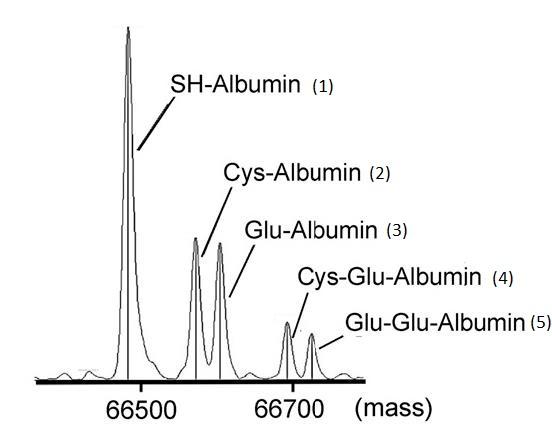
Credit: Associate Professor Hiroshi Watanabe
A research group from Kumamoto University, Japan has discovered that cysteinylated albumin (oxidized albumin) in serum can be used as an early diagnostic marker for diabetic kidney disease. Compared with urinary albumin, serum oxidized albumin not only reflects renal pathology at an earlier stage, but can also predict the progression of renal pathology by its degree of elevation. The researchers believe that it can be used as a new diagnostic marker for early diagnosis of diabetic kidney disease.
Diabetic kidney disease is one of three major complications of diabetes. Its prognosis is difficult to improve as it progresses so diagnosing it as early as possible and providing appropriate therapeutic intervention is important. Albumin is the most abundant protein in blood serum and urine, and urinary albumin (albuminuria) is used to diagnose diabetic kidney disease. Albumin maintains osmotic pressure in serum and functions as a carrier of fatty acids and drugs. It is also frequently used as an early marker for diabetic nephropathy because albuminuria increases as kidneys begin failing. However, it is now clear that there are many cases of negative albuminuria in diabetic kidney diseases, especially those derived from type 2 diabetes. Thus, there is a need to develop new early diagnostic markers for these complex and diverse conditions.
In this study, the research group evaluated the association between pathological renal progression and post-translational modifiers of serum albumin in 257 type 2 diabetic patients. Serum albumin has a half-life of about 20 days and is known to undergo various chemical modifications (post-translational modifications) depending on the environment in the body. Researchers measured five post-translational modifications using a mass spectrometer and found that the level of cysteinylated albumin (oxidized albumin), an oxidized modification of albumin with one molecule of cysteine added, increased with the progression of diabetic kidney disease. This indicated that oxidized albumin can be used as a diagnostic marker for renal pathology. They also found that oxidized albumin may reflect earlier renal pathology compared to urinary albumin. Furthermore, patients with high levels of oxidized albumin showed faster progression of renal disease after two years, indicating that oxidized albumin can also be used to predict renal disease progression.
“Our study has shown that oxidized albumin may reflect early renal pathology even better than urinary albumin, which is the current gold standard,” said Associate Professor Hiroshi Watanabe, who led this study. “In particular, since kidney disease derived from type 2 diabetic patients includes many cases of negative albuminuria, we expect serum oxidized albumin can be used as a new diagnostic marker for diabetic kidney disease.”
###
This research was posted online in Diabetes Care on 26 April 2021.
Source: Imafuku, T., Watanabe, H., Oniki, K., Yoshida, A., Kato, H., Nakano, T., … Maruyama, T. (2021). Cysteinylated Albumin as a Potential Biomarker for the Progression of Kidney Disease in Patients With Type 2 Diabetes. Diabetes Care, dc203003. doi:10.2337/dc20-3003
Media Contact
J. Sanderson & N. Fukuda
[email protected]
Original Source
https:/
Related Journal Article
http://dx.




